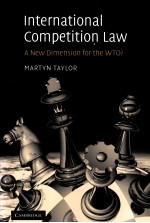

INTERNATIONAL COMPETITION LAW A NEW DIMENSION FOR THE WTO?PDF电子书下载
- 电子书积分:15 积分如何计算积分?
- 作 者:MARTYN D.TAYLOR
- 出 版 社:CAMBRIDGE
- 出版年份:2006
- ISBN:0521102278
- 页数:500 页
1 Introduction 1
PART Ⅰ An International Competition Agreement is Desirable 7
2 Is competition law beneficial? 7
2.1 What is competition law and what is its rationale and philosophy? 8
2.2 Distributional fairness as a co-objective of competition law 24
2.3 How does competition law relate to other governmental laws and policies? 28
2.4 Conclusion:competition law is beneficial 33
3 Is an international competition agreement desirable? 34
3.1 The globalisation of competition 35
3.2 Extraterritoriality and jurisdictional conflict (a 'non-co-operative' approach) 53
3.3 Conclusion:an international competition agreement is desirable 69
4 Is there a sufficient basis for an international competition agreement? 71
4.1 Competition laws within the Asia-Pacific Economic Community 72
4.2 Macro issues:objectives,methodology and structure of competition laws 76
4.3 Micro issues:particular content and application of competition laws 79
4.4 Regulation of market structure - merger laws 84
4.5 Regulation of unilateral conduct - anti-monopoly laws 89
4.6 Regulation of concerted conduct - horizontal and vertical agreements 93
4.7 Exemptions from the application of competition laws 97
4.8 Administration and enforcement of domestic competition laws 100
4.9 Conclusion:there is a sufficient basis for an international competition agreement 103
5 Have existing cross-border initiatives proved sufficient? 106
5.1 A network of bilateral competition agreements 107
5.2 The current momentum towards plurilateral agreement 122
5.3 Current initiatives towards the realisation of multilateral agreement 129
5.4 Insights into an international competition agreement 139
5.5 Conclusion:existing initiatives towards the regulation of cross-border conduct have clear limitations that could be overcome by an international competition agreement 142
PART Ⅱ The WTO Would Provide a Suitable Institutional Vehicle 147
6 Would the WTO provide a suitable institutional vehicle for an international competition agreement? 147
6.1 Historical relationship between trade law and competition law 148
6.2 Are international trade law and international competition law complementary? 163
6.3 Can international trade theory and international competition theory be reconciled? 176
6.4 Conclusion:the WTO could provide a suitable institutional vehicle for an international competition agreement 183
7 Would a WTO competition agreement promote international trade? 185
7.1 The effects of anti-competitive practices on international trade 187
7.2 The Kodak-Fuji Film case - application of WTO law to anti-competitive conduct 191
7.3 To what extent do domestic competition laws otherwise prevent such conduct? 201
7.4 International Conduct 212
7.5 Existing WTO provisions regulating Domestic Conduct and International Conduct 217
7.6 Conclusion:an international competition agreement would promote international trade 221
8 Would competition regulation of trade measures promote competition? 224
8.1 The effects of trade measures on international competition 226
8.2 Domestic Measures 232
8.3 International Measures 241
8.4 Government Commercial Activities 251
8.5 Conclusion:competition regulation of trade measures would promote competition 257
9 Should competition principles be introduced into anti-dumping law? 260
9.1 The basis and purpose of modern anti-dumping law 261
9.2 International competition law as an alternative to anti-dumping law 271
9.3 Conclusion:competition principles should be introduced into anti-dumping law 283
PART Ⅲ The Optimal Form for a WTO Competition Agreement 289
10 What are the optimal objectives and principles for a WTO competition agreement? 289
10.1 What would be the optimal institutional vehicle for an international competition agreement? 289
10.2 Existing proposals for a WTO competition agreement 298
10.3 The objectives for a WTO competition agreement 315
10.4 Core principles for a WTO competition agreement 318
10.5 Conclusion:the WTO is the optimal vehicle for an international competition agreement 334
11 What is the optimal content for a WTO competition agreement? 336
11.1 To what extent should any WTO competition agreement seek to achieve harmonisation of domestic competition laws? 337
11.2 To what extent should any WTO competition agreement seek to proscribe minimum international standards? 348
11.3 To what extent should the provisions of a WTO competition agreement be legally enforceable as binding precepts of international law? 355
11.4 Amendments to existing WTO trade rules 365
11.5 Conclusions on optimal content and approach for a WTO competition agreement 368
12 What is the optimal structure for a WTO competition agreement? 370
12.1 What would be the most appropriate institutional basis for a WTO competition agreement to promote effective compliance with its substantive obligations? 371
12.2 What would be the most appropriate institutional basis for a WTO competition agreement to mitigate potential international competition disputes? 378
12.3 What would be the most appropriate institutional basis for a WTO competition agreement to resolve international competition disputes? 383
12.4 Would the suspension of trade concessions be an appropriate sanction for a failure to comply with a WTO competition agreement? 389
12.5 Conclusions on optimal institutional structure for a WTO competition agreement 393
13 Would a WTO competition agreement be politically achievable? 395
13.1 The negotiation of a WTO competition agreement 395
13.2 Meeting the concerns of developing countries 413
13.3 Four-point incremental strategy for realising a WTO competition agreement 417
13.4 Conclusion:a plurilateral WTO competition agreement is politically achievable 421
14 Conclusion:a plurilateral competition agreement should be incorporated into the WTO 423
14.1 Summary 423
14.2 Conclusion 434
APPENDIX:Draft negotiating text for a plurilateral WTO competition agreement 435
Index 483
- 《化工项目设计训练 通过案例研究学习设计 第2版》Martyn S.Ray,Martin G.Sneesby著;余立新,彭勇译 2003
- 《THE BREAKUP OF YUGOSLAVIA》MARTYN RADY 1993
- 《THE LAW GOVERNING LAWYERS NATIONAL RULES》SUSAN R.MARTYN LAWRENCE J.FOX W.BRADLEY WENDEL 2011
- 《INTERNATIONAL COMPETITION LAW A NEW DIMENSION FOR THE WTO?》MARTYN D.TAYLOR 2006
- 《An introduction to essential algebraic structures》Martyn R. Dixon ; Leonid A. Kurdachenko ; Igor Ya. Subbotin 2015
- 《Methodology who needs it》Hammersley Martyn 2011
- 《CORPORATE GOVERNANCE A PRACTICAL HANDBOOK》KAREN MARTYN 2012
- 《The Limits of Social Science Causal Explamation and Value Relevance》Martyn Hammersley 2014
- 《A PRACTITIONER'S GUIDE TO THE LAW AND REGULATION OF MARKET ABUSE》MARTYN HOPPER AND NIKUNJ KIRI 2013
- 《Digital Video Communications》Martyn J.Riley 1997
